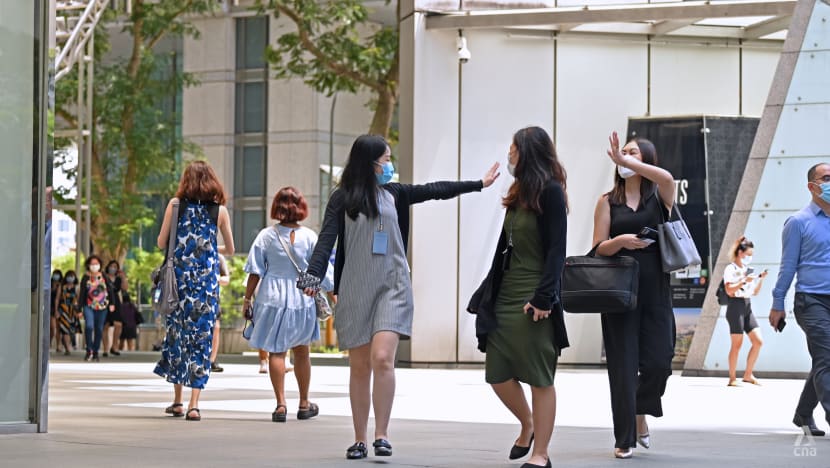Commentary: Declining literacy skills among younger adults has implications for Singapore’s workforce
Adult literacy is an essential foundation for the acquisition of further knowledge and skills, and hence key to workers staying employable, says the Lee Kuan Yew School of Public Policy’s Terence Ho.

Office workers wearing protective face masks at Raffles Place on Sep 6, 2021. (Photo: Gaya Chandramohan)

This audio is generated by an AI tool.
SINGAPORE: It is well-known that Singapore’s 15-year-olds regularly perform among the best in the world in literacy and numeracy tests. What may not be as familiar to most is how Singapore adults perform in similar tests.
The Survey of Adult Skills, an international study under the OECD Programme for the International Assessment of Adult Competencies (PIAAC), offers some insight.
Singapore took part in both the PIAAC Cycle 1 surveys (conducted between 2011 and 2018) and the recent Cycle 2 survey (2022 to 2023) whose results have just been released.
The results of the PIAAC study show that Singapore is closing the gap with the OECD average in literacy, and moving into the top third of participating countries in numeracy. This largely reflects Singapore’s improving education profile as younger cohorts with higher skills enter the workforce and older cohorts with relatively lower proficiency retire.
Given that many older Singaporeans did not have the educational opportunities that our young today enjoy, it’s not surprising that our adults do not perform as well relative to their international peers.
ADULT LITERACY A CONCERN
What is somewhat surprising is the decline in literacy proficiency as people get older, a trend seen in most participating countries including Singapore.
While Singapore bucked the trend of declining overall literacy scores experienced by most countries between the first and second rounds of the PIAAC study, its literacy scores fell between the two cycles for both lower-educated and more highly educated adults. In addition, the gap between the different educational groups in Singapore was larger than in most other countries.
This has implications for the competitiveness of Singapore’s workforce and economy, particularly given the importance of human capital to our economy.
Adult literacy, along with numeracy, is an essential foundation for the acquisition of further knowledge and skills, and hence key to workers staying employable, especially as technology rapidly changes.
Adults with higher literacy proficiency generally have better job opportunities, even after accounting for educational attainment. These findings highlight the importance of investing in adult education and training.
In Singapore, the drop in literacy proficiency seems to start early at 27 to 34 years old. The decline among respondents in this age bracket and the next is concerning, as these span the prime working ages where workers are expected to make significant contributions to the economy and society. It suggests that people of all ages, even those in the early stages of their careers, need to continue learning and using their skills to maintain proficiency.
Fortunately, the decline in literacy with age does not appear to be inevitable, given that two participating countries, Denmark and Sweden, did not experience significant loss in proficiency among adults up to age 65.
IMPLICATIONS FOR LEARNING AT SCHOOL, WORK AND HOME
The PIAAC findings on literacy and numeracy can help inform Singapore’s approach to education and training.
It’s important to recognise that learning is a lifelong process, starting from childhood through to adulthood. Building a strong foundation during the schooling years is key, with an emphasis on cultivating a love for learning and growth mindsets that will enable continual learning through life.
SkillsFuture programmes should continue to reinforce these foundational skills, in addition to providing job-ready, industry relevant training.
While the SkillsFuture Mid-Career Enhanced Subsidy and the new SkillsFuture Level-Up Programme are targeted at mature workers aged 40 and above, the PIAAC findings on early age decline in literacy suggest that younger workers may need attention too.
A study by Kyrolainen and Kuperman (2021) found that while formal education was the strongest predictor of PIAAC literacy scores in all countries, another significant factor was the amount of reading people engaged in at work and at home.
Employers should think about how to strengthen their workers’ foundational skills by curating purposeful learning opportunities such as projects, workshops or innovation challenges.
Beyond formal training, employers could also come up with creative ways to make learning fun, such as through games or quizzes. Some organisations have a monthly book club gathering where staff members can discuss thought-provoking books. Besides fostering social interaction, such events also help encourage and sustain literacy among employees.
Initiatives such as the National Reading Movement spearheaded by the National Library Board, along with events like the annual Singapore Writers Festival, could also help build a culture of reading and literary engagement in Singapore.
A significant predictor of PIAAC literacy scores identified by Kyrolainen and Kuperman was family influence – proxied by the number of books in one’s childhood household - suggesting that a love for literature can be passed from one generation to the next.
As an advanced economy with an excellent education system, Singapore should set its sights on becoming one of the world’s most literate societies in the near future. This can be realised through a concerted effort by all stakeholders, recognising what is at stake.
Terence Ho is Associate Professor in Practice at the Lee Kuan Yew School of Public Policy. He is the author of Future-Ready Governance: Perspectives on Singapore and the World (2024).












